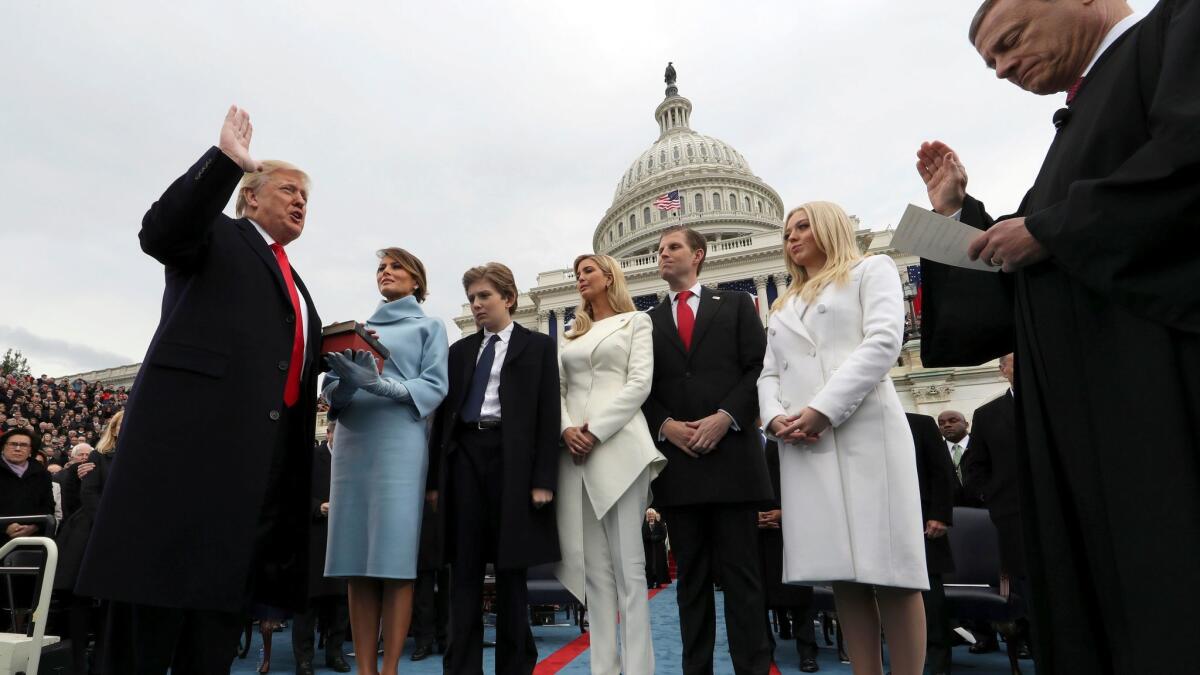Column: The Trumpist future: A world without an exceptional America

For the 75 years since the United States entered World War II, U.S. foreign policy has started from three broad premises shared by most American leaders.
One is American exceptionalism, the idea that the United States is a unique country with a special responsibility to exert global leadership. Exceptionalism, combined with military and economic power, spawned a second, revolutionary notion: that the United States should try to promote democracy and human rights around the world, or at least defend them when they were in peril. The third is that the best and cheapest way for the United States to lead is by building strong alliances, usually with other democracies.
Donald Trump has abandoned all three of those premises. And in their place, he has revived an old slogan of self-interest, “America first.” That could lead to disaster.
Never before has a modern president said he doesn’t believe the United States is special. Barack Obama came close, but when conservatives howled he beat a hasty retreat.
U.S. diplomacy, however inconstant, has helped to free millions ... from oppression. If Trump abandons that effort, it’s not a surprise, but it’s a tragedy.
In 2015, though, Trump said this when he was asked to define exceptionalism: “I don’t like the term … because I think you’re insulting the world,” he told tea party activists in Texas. “If you’re German, or you’re from Japan, or you’re from China, you don’t want to have people saying that.”
It wasn’t only the tender feelings of foreigners that he had in mind.
“Germany is eating our lunch,” he said. “We’re dying. We owe $18 trillion in debt. I’d like to make us exceptional…. I want to take back everything from the world that we’ve given them.”
When traditional politicians describe American exceptionalism, they usually talk about values — about democracy, or individual freedom, or entrepreneurship, or racial and ethnic diversity. Trump’s measure of exceptionalism was material wealth — specifically, the trade balance and national debt.
In his inaugural address last month, he barely mentioned American values. He promised to defeat Islamic State (“Make America safe again”) and revive the economy (“Make America wealthy again”). But the word “democracy” wasn’t there at all.
Here’s what the president said about foreign policy in that speech: “We will seek friendship and goodwill with the nations of the world, but we do so with the understanding that it is the right of all nations to put their own interests first. We do not seek to impose our way of life on anyone, but rather to let it shine as an example for everyone to follow.”
That was a signal — an implicit rebuke to both Obama and George W. Bush, who used their inaugurals to reaffirm the goal of promoting democracy and human rights.
The following week, when Trump’s nominee for secretary of State, Rex Tillerson, was asked in his confirmation hearing to condemn human rights abuses in Russia, Syria and Saudi Arabia, he dodged the questions.
It’s debatable, of course, how high on any president’s priority list democracy and human rights should be. But Trump has betrayed no interest in the question.
By all evidence, his administration will spend little time or energy on those goals, which have been embraced, in different measure, by every president since Jimmy Carter — including, emphatically, Ronald Reagan. U.S. diplomacy, however inconstant, has helped to free millions of people from oppression. If Trump abandons that effort, it’s not a surprise, but it’s a tragedy.
That brings us to the most worrisome change: Trump’s devaluation of alliances.
The president says most other countries are ripping us off — especially allies that aren’t spending enough on their defense. “They’re laughing at us,” he complains.
He has a solid argument that allies haven’t met their commitments for defense spending; most of them haven’t. But he’s talked about NATO and other treaty arrangements as if they were mercenary contracts, not partnerships among countries with values in common. He’s given longtime allies like Australia, which sent troops to help Americans fight in Afghanistan, less courtesy than adversaries like Russia.
The underlying principle is not “pay any price, bear any burden”; it’s “what have you done for me lately?”
The allies have gotten the message. Some, especially the ones directly threatened by Russia, are rushing to increase their defense spending. (Score one for Trump.) But all of them are asking whether they can count on the United States to keep its promises in the future.
Trump has embraced “a narrower interpretation of vital American interests than his predecessors,” the London-based International Institute of Strategic Studies concluded in a recent report.
“Trump’s foreign policy will be driven principally by the pursuit of American economic advantage, for which he will likely sacrifice some of the security concerns of his allies,” the institute said. “At a minimum, he will leave … America’s partners uncertain about U.S. reliability.”
It is “a pivotal change, with potentially profound negative implications for global stability.”
That sounds right. Trump has promised Americans security and prosperity. By narrowing our national goals, downgrading our values and eroding our alliances, he’s likely to get neither.
Twitter: @doylemcmanus
Follow the Opinion section on Twitter @latimesopinion and Facebook
More to Read
A cure for the common opinion
Get thought-provoking perspectives with our weekly newsletter.
You may occasionally receive promotional content from the Los Angeles Times.







